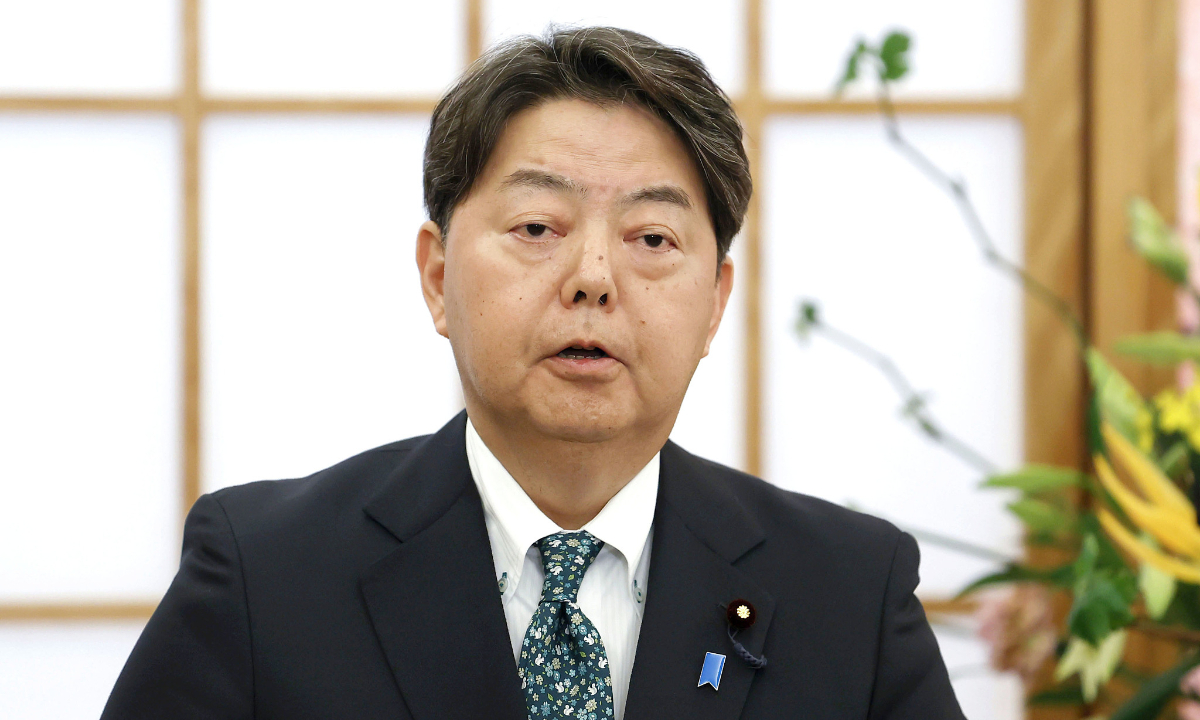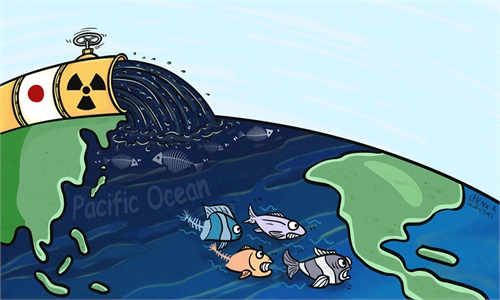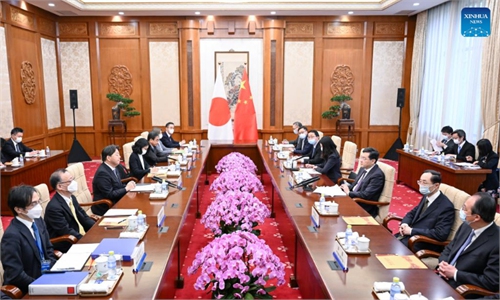Premise for Japan's China diplomacy should be not to serve as US' pawn: Global Times editorial

Japan's Minister for Foreign Affairs Yoshimasa Hayashi Photo:VCG
Yoshimasa Hayashi is the first Japanese foreign minister to have visited China in three years and three months, indicating the special nature of the visit and the difficult situation facing China-Japan relations. On Sunday, Chinese State Councilor and Foreign Minister Qin Gang met and had lunch with Hayashi. On the same day, Chinese Premier Li Qiang and Wang Yi, member of the Political Bureau of the Communist Party of China Central Committee and director of the Office of the Central Commission for Foreign Affairs also met with Hayashi separately. The Chinese side's courtesy reflects the sincerity and importance attached to China-Japan relations.During this three-year and three-month period, a series of negative diplomatic, military and economic moves by Japan have given us reasons to be concerned about possible regressions in Japan's policy toward China and to question whether Japan continues to adhere to the direction of peaceful development. During this time, the Japanese side has accumulated a large pile of issues that it needs to clarify and explain to China. The good thing is that both China and Japan still have the will to strengthen exchanges and communication, and neither wants their bilateral relations to continue to decline. Hayashi's visit to China at this time mainly has constructive significance, but it remains to be seen to what extent it will ease China-Japan relations.
Qin bluntly urged Japan not to be America's pawn in the meeting, something that is arguably the most prominent part of Japan's negative movement toward China in the past two years. The Chinese Foreign Minister cited the example of the semiconductor industry. Prior to Hayashi's leave, the Japanese Ministry of Economy, Trade, and Industry announced that starting from July, Japan will impose export restrictions on 23 types of chip manufacturing equipment in six categories to "prevent countries that pose a military threat from getting access to advanced Japanese technology." This move is undoubtedly in cooperation with the US' suppression of Chinese technology and "decoupling" push. This is also an expansion and escalation of Japan acting as a US' pawn.
ary field has almost become undisguised and unrestrained. Japan once wanted to maintain the state of "cold politics, hot economics" with China, in order to avoid negative impacts on Japan's economy caused by political alienation or even confrontation. However, from the current situation, it is impossible to set up a firewall. In other words, Japan's negative trend toward China will eventually pay a huge price both politically and economically, seriously damaging Japan's interests, and even bringing uncontrollable risks.
The reality is clear. Japan's impulse to break free from the constraints of the peace constitution is becoming stronger and the corresponding actions are becoming more significant. Hyping the so-called "China threat theory" is not enough to dispel the doubts of neighboring countries and the Japanese people. According to the Kishida government's plan, Japan's defense spending will double in the next five years. This not only wastes the country's wealth and adds a heavy burden on its people, but it also raises fundamental questions about whether Japan is taking a path of peaceful development or not. Japan's unusual "attention" on the situation in the Taiwan Straits makes China more vigilant. The starting point of Japan serving as a US' pawn is its wrong perception of China. Wang Yi when meeting with Hayashi on Sunday emphasized that the root cause of the noises and disruptions in China-Japan relations is that some forces in Japan deliberately follow the wrong US policy toward China and cooperate with the US to smear and provoke issues concerning China's core interests.
In fact, instead of unnecessarily worrying about China's rapid development and even scaring itself with a fear that China after becoming strong will target Japan, Japan should be more worried about the serious concerns it has already aroused in neighboring countries. Japan's military expansion and preparation, as well as its active introduction of forces from outside the region, will trigger a chain reaction and greatly worsen the regional security environment. China is the biggest victim of Japanese militarism, and Japan has an obligation to offer an explanation to China. On Friday, China and Japan completed construction of a direct telephone line under the defense sector's maritime and air liaison mechanism, which is necessary to avoid accidental frictions and conflicts between the two countries. But ultimately, this is only a temporary solution and does not address the fundamental issues. How to implement the consensus that the two countries are cooperative partners and do not pose a threat to each other into specific policies is a question that Japan must answer well at present.
What is noteworthy is that the Japanese public's biggest focus on Hayashi's China visit is actually the arrest of a Japanese citizen suspected for engaging in espionage activities in China. Some claimed Hayashi is coming to demand the release of the man and even attacked China for engaging in "hostage diplomacy." Magnifying an individual case between China and Japan and distorting and sensationalizing it is a common practice by Japanese public opinion. Understanding and interpreting the China-Japan relationship from a narrow, petty-minded perspective, many Japanese have come into a dead end when it comes to their perception of China.
Last year marked the 50th anniversary of the normalization of diplomatic relations between China and Japan, and this year marks the 45th anniversary of the signing of the China-Japan Treaty of Peace and Friendship, both of which are important milestones in the history of China-Japan exchanges. Chinese President Xi Jinping met with Japanese Prime Minister Fumio Kishida last year in Bangkok, which has pointed the direction for bilateral ties. Japan needs to get rid of its narrow-mindedness and observe the China-Japan relationship with a broader vision and higher perspective, seeing beyond the current obstacles to the vast prospects of mutually beneficial cooperation between China and Japan. In particular, not "acting as the US' pawn" is an important prerequisite for Japan to build a constructive and stable relationship with China. It's hoped that Japan and China can work together to turn the potential for development in bilateral ties into tangible benefits for the peoples of both countries.


